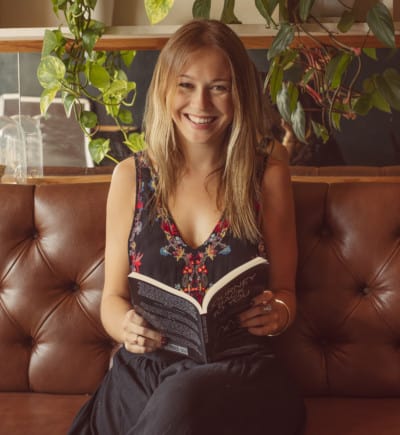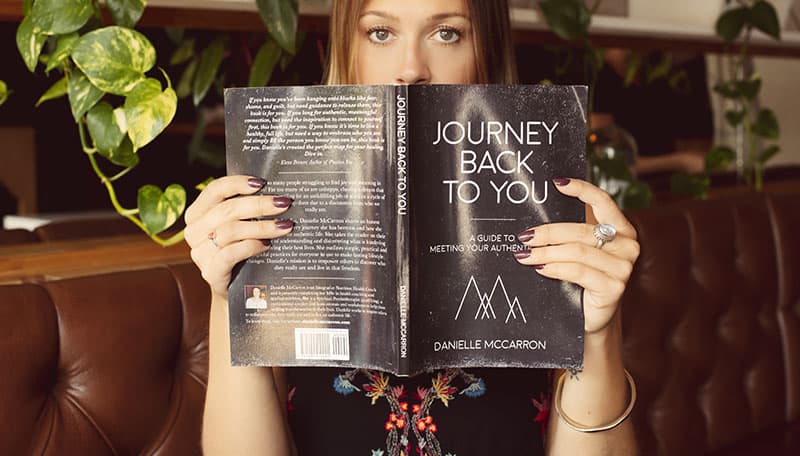Danielle McCarron is a Recovery Advocate, Integrative Nutrition Health Coach (MSc), teacher, healer, speaker and student. She’s also a brave AF Torontonian who has survived alcohol use disorder and substance use disorder, and has been able to get clean and live to see the other side.
In her new book, Journey Back to You, Danielle courageously shares her recovery story while dishing out lessons she’s learned about daily practices that have helped her make lasting lifestyle choices and how she continues to explore a deeper understanding of self.
We applaud Danielle’s daring spirit, honesty and candour, and we know that her story will help many people. With September being National Recovery Month, we were delighted to be able to chat with Danielle about how she initially stopped drinking and using, and how she maintains her health today.
SDTC: What did your recovery look like when you first started?
DM: I had just finished a year of law school in London, England, and deferred in order to get myself healthy. In that, I had the opportunity to really devote myself to recovery. I got sober through twelve-step programs, so I dove head first into meetings. It is recommended that you do ninety meetings in ninety days, and honestly, I probably did 180 meetings in ninety days. I really committed myself to the program. I got phone numbers of other women who were doing well in recovery and met with them as often as possible. I met new people, read a ton of self-help books on spirituality and recovery, meditated and jumped into yoga.
I was honestly so happy to not be hungover and feel like garbage every day that I really enjoyed early recovery. I learned about gratitude and where my addiction could take me and let that lead the way. I was constantly talking to other women and learning as much as I could about addiction and recovery, putting into practice some suggestions and navigating what worked for me. I devoted a year to myself and getting healthy.
How old were you when you decided to take action?
I was twenty-four years old when I got sober. For me, I sort of realized I had a problem and got sober all at once. I am a pretty all-or-nothing person, and once I grasped that drinking was really causing the problems in my life (the problems in my life weren’t causing my drinking), I knew I had to do something about it.
How did you know that you needed to change your life? What moved you to take the first steps?
My drinking and use took off when I moved to London, and my partying started to look a bit different than everyone else’s. I was always a party girl and had so much fun, and it was taking a turn and becoming dark and lonely. I began drinking at home by myself a lot and isolating so I could drink the way (and how much) I wanted to, which was basically in bed.
The beginning of the end of my drinking came when I took a bunch of pills in a blackout in a suicide attempt. I didn’t stop drinking immediately after that, but it was brought to the attention of the people in my life at that point, and I was quickly learning that I couldn’t control it anymore. When I moved back to Toronto from London and saw what the destruction of my addiction was doing to my family, I reached out and asked someone I knew who was sober for help.
What does your recovery look like today? Or, put another way, how do you remain healthy?
Recovery today looks like connection—to who I really am and authentic connection with other people. It involves staying really vigilant with my routines and necessary introspection time. I meditate and journal daily, keep in touch with other friends I know who are sober, go to meetings and try to be of use to others every day.
I remain healthy by being honest about whatever is going on with me, particularly emotionally, no matter what fears come up around that honesty. I exercise, do yoga, walk my dogs and try to get into nature as often as possible. For me, recovery has to be holistic; therefore, I need to be emotionally, physically, mentally and spiritually well in order to stay in connection with myself.

What has been the most challenging aspect of recovery?
I go through phases of not always accepting recovery. This is usually triggered by seeing people that I love and care about struggling with their own sobriety. I have been so blessed to meet so many people who embrace recovery, but it doesn’t come easily. A lot of people relapse, and it is devastating watching people you care about not make it through their addiction.
I can go to pretty dark places still with my anxiety and be resentful about how “on it” I have to be on a daily basis. Basically, I struggle with acceptance that addiction is even a thing (as ridiculous as that might sound) and just want to help as many people as I can. But we can’t save anyone, and that is really hard for me to accept sometimes.
What has been the most rewarding aspect?
On the other side of that coin, the most rewarding aspect is being able to be useful in this world, to share my story in order to help others know that they aren’t alone. Watching the light of recovery go off in someone else’s eyes is unlike anything I have ever experienced, and in my four years of recovery, it has yet to get old.
The fact that I have not had a hangover in a long time is pretty fucking fantastic, too. Being present in my life through all of the ups and downs, and really feeling all of the things, is remarkable and something I never thought I would appreciate, as I always ran from my feelings—good or bad.
Being open-minded to life now and meeting people I never would have met otherwise—I found what I was looking for in recovery that I was always looking for in a bottle, and that is true connection.
What did “fun” look like when you were struggling with substance use? What does it look like today?
I lived for partying and thrived off of being super fun and being the life of the party. Fun looked like me dancing on every surface you can imagine. It looked like me needing to be the centre of attention and basically gaining my self-worth and validity in whatever way I felt I needed to in that moment. I loved music and festivals and running around everywhere and meeting new people. I stayed out for days at a time and never missed a party (in fact, I was usually the one enticing everyone to come out for the night of their lives). I loved dancing and kissing everyone, and I thrived off of all of the drama.
Eventually, fun was me “watching shows” in my apartment in London and getting alcohol from different stores so that people didn’t think I had a drinking problem. It was drinking for so many days in a row that every bender ended up with me in the hospital because I wasn’t functioning anymore.
Today, fun looks similar in some ways—I still love to dance and will never miss a good concert. The difference is now I am present and actually in touch with how I am operating in those moments. I am not missing half of a concert to go get drinks, and I don’t need to stay out until 5 a.m. dancing and ruin the next three days with catastrophic hangovers (I genuinely believed I was going to die every time I was hungover—they were so bad).
I love intimate gatherings now with just a couple of close friends or one-on-one time with people. Fun to me is showing up for people in my life who rely on me. It’s waking up in the morning and being able to have a full day of activities—going to the cottage, travelling everywhere, and genuinely laughing because I can feel joy again.
What are the things that you appreciate more now?
Mornings. Mornings. Mornings. I NEVER thought I would be a morning person, and now if I sleep in, I feel like I am wasting my days (don’t get me wrong, every once in a while, a good sleep in is so key). I have always had the travel bug, and travelling is actually so much better in recovery, which I never imagined it would be. Partying was such a big part of it, and now I can meet like-minded people in other ways and wake up and enjoy the day.
I appreciate each and every day in ways I only took for granted before. I feel like now I am actually living instead of merely existing through life.
What do you want to say to the woman still struggling?
That it gets better. That recovery is possible. To never give up. That even if my story doesn’t sound similar to yours, the emotions and pain behind addiction is all the same. That addiction is an experience we have from being disconnected from who we really are and that by learning to get in touch with who we really are, we can live a life of freedom. That it is really, really beautiful, even on bad days, because there is nothing that won’t be made worse by using whatever you’re using to numb that pain. That I love you and see you and feel you and am here for you and to please reach out to me or someone else you know if you can. I promise you that life gets so big and beautiful and full in recovery. That you are not alone.
Anything else you’d like to share?
Really, I would just like to share that recovery from anything is possible. That especially for women, we are told drinking is how we have to live to fit in or be cool or sexy or “unwind,” and that it isn’t true. That there are so many better ways to really live life, and you don’t have to hit this really crazy bottom to find recovery. I thought recovery was going to mean the end of my life, and in reality, it was a whole new beginning. Now, instead of hating being sober, it is probably the thing I love most about myself. I believe change is always, always possible. If I can do it, you can, too.



 Follow Us On Instagram
Follow Us On Instagram
